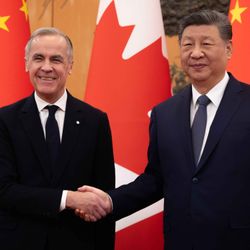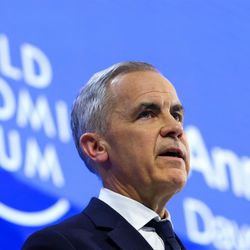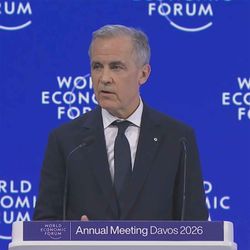Share

CANADALAND
(Détours) Rentrée scolaire féministe
AVERTISSEMENT : Dans cet épisode, nous discutons de violence à caractère sexuelle et de violence basée sur le genre, y compris la violence impliquant des mineurs. Si vous êtes à la recherche de soutien, le lien suivant vous dirigera vers des ressources à travers le Canada : https://canadianwomen.org/fr/vous-cherchez-un-soutien/
Alors que le mouvement #MoiAussi battait son plein en 2017, le gouvernement du Québec adoptait une loi-cadre qui vise à prévenir et combattre les violences sexuelles dans les cégeps et les universités. Emilie invite Léa Clermont-Dion pour discuter de l’impact de cette loi-cadre, ainsi que des efforts militants et politiques pour mettre en place une telle loi dans les institutions préscolaire, primaire et secondaire. Auteure et chercheure universitaire, Léa explore également les questions féministes par le biais du cinéma. Emilie et Léa abordent le sujet difficile de la cyberviolence en discutant du film documentaire co-réalisé par Léa, Je vous salue salope : La misogynie au temps du numérique.
CONTENT WARNING: In this episode, the co-hosts discuss sexual violence and gender-based violence, including violence involving minors. If you are seeking support, the following link will direct you to resources across Canada: https://canadianwomen.org/support-services/
While the #MeToo movement was in full swing in 2017, the Quebec government adopted a framework law aimed at preventing and combating sexual violence in CEGEPs and universities. Emilie invites Léa Clermont-Dion to discuss the impact of this framework law, as well as the activist and political efforts to implement such a law in preschools, elementary schools, and high schools. An author and academic researcher, Léa also explores feminist issues through filmmaking. Emilie and Léa tackle the difficult subject of cyber-violence by discussing the documentary film co-directed by Léa, Backlash: Misogyny in the Digital Age.
Animation: Emilie Nicolas
Générique: Nancy Pettinicchio (Production), Tristan Capacchione (Production technique), Karyn Pugliese (Rédactrice en chef)
Coanimation: Léa Clermont-Dion
Pour en savoir plus, allez sur notre site
Commanditaires : PolicyMe, Athletic Greens
Si vous appréciez ce podcast, soutenez-nous ! Vous obtiendrez un accès en prime à toutes nos émissions gratuitement, y compris les premières diffusions et le contenu bonus. Vous recevrez également notre lettre d'information exclusive, des rabais sur les produits dans notre boutique, des billets pour nos événements en direct et virtuels, et surtout, vous ferez partie de la solution à la crise du journalisme au Canada. Vous ferez en sorte que notre travail reste gratuit et accessible à tout le monde.
Vous pouvez écouter sans publicité sur Amazon Music, inclus avec Prime.
More episodes
View all episodes

1305. Trump's Crashing Out Over Carney's China Deal
31:33||Ep. 1305Carney’s deal with China is pissing off Trump, but it’s exactly the sort of leverage Canada needs for the upcoming CUSMA negotiations. It’s more than just EVs and canola, and it’s more than a return to our previous trade arrangements with China. Carney’s deal signals how Canada intends to navigate the so-called “new world order.” But, with Xi Jinping purging his top generals, is China really as “predictable” as Carney suggests? Host: Jesse BrownCredits: James Nicholson (Producer), Kattie Laur (Associate producer and Fact Checking) Caleb Thompson (Mixing and Mastering), max collins (Director of Audio), Jesse Brown (Editor)Guest: Jan Wong Further reading: Preliminary Agreement-In-Principle to Address Economic and Trade Issues between Canada and the People's Republic of China - Government of Canada No plans for China free trade deal, Carney says as Trump fixates on Canada | CBC NewsCanada wants to be 1st in North America to build EV with Chinese knowledge: senior official | CBC News China dropping ban on Canadian beef may boost industry resilience, analysts say - The Globe and Mail Is Carney’s China deal a misstep or master stroke? | National PostChina’s Zijin Gold to acquire Canadian miner Allied Gold in $5.5-billion deal - The Globe and Mail Xi Jinping has dismissed two of China’s most senior generals. What does this mean? Las Vegas casino owner offers to take Canadian dollars on par with U.S. currency - CTV NewsThe Liberals’ unacceptable Charter breach - The Globe and Mail Sponsors:Fizz: Visit fizz.ca and activate a first plan using the referral code CAN25 to get 25$ off and 10GB of free data.Douglas: Douglas is giving our listeners a FREE Sleep Bundle with each mattress purchase. Get the sheets, pillows, mattress and pillow protectors FREE with your Douglas purchase today. Visit douglas.ca/canadaland to claim this offer.MUBI: To stream great cinema at home, you can try MUBI free for 30 days at mubi.com/canadaland. If you value this podcast, Support us! You’ll get premium access to all our shows ad free, including early releases and bonus content. You’ll also get our exclusive newsletter, discounts on merch at our store, tickets to our live and virtual events, and more than anything, you’ll be a part of the solution to Canada’s journalism crisis, you’ll be keeping our work free and accessible to everybody.
1304. Carney-Man: With Middle Power Comes Middle Responsibility
36:49||Ep. 1304Carney’s speech made headlines around the world and positions Canada as a global thought leader. Why did it capture so much international attention, and will Carney’s Davos kudos benefit Canada in the long run? Jan Wong joins to unpack Carney’s rhetorical triumph and to dish on Margaret Atwood’s lunch beef 30 years later. Host: Jesse BrownCredits: James Nicholson (Producer), Kattie Laur (Associate producer and Fact Checking) Caleb Thompson (Mixing and Mastering), max collins (Director of Audio), Jesse Brown (Editor)Guest: Jan Wong Call in to Off The Record on Thursday, January 29 from 4:30pm to 6:30pm EST by going to callinstudio.com/show/canadaland or dialing in at 888-401-7056 Further reading: Carney's Davos speech draws reaction from around the world | CBC News Mark Carney's Davos speech: Reaction from BBC, NYT, Rolling Stone - CTV News Mark Carney’s Davos speech is a ‘manifesto of free people.’ Here’s what else the world is saying - Toronto Star As the world inches back to a pre-WW2 order, the 'middle powers' face a grave new challenge - BBC New Zealand is fiddling while the world ruptures. We need to listen to Mark Carney - Steve Maharey - New Zealand Herald ‘A rupture, not a transition’: The Davos bombshell that Australia can’t ignore - Sydney Morning HeraldCarney makes clear the world’s choice - The Japan Times Time for Western middle powers to wake up - Opinion - Chinadaily.com.cn Michael Taube: I'm a speechwriter. Carney did better than Trudeau at Davos. But that's a low bar - National PostPierre Poilievre: Carney's Davos speech highlights that it is Liberal rhetoric that doesn't match reality- National Post Margaret Atwood can read your palm and holds a grudge - The National - CBC [Video]Federal Conservatives trade journalists for partisan cheerleaders | Canada's National Observer: Climate News Sponsors: Squarespace: Check out Squarespace.com/canadaland for a free trial, and when you’re ready to launch use code canadaland to save 10% off your first purchase of a website or domain.MUBI: To stream great cinema at home, you can try MUBI free for 30 days at mubi.com/canadaland.BetterHelp: Visit BetterHelp.com/canadaland today to get 10% off your first month. If you value this podcast, Support us! You’ll get premium access to all our shows ad free, including early releases and bonus content. You’ll also get our exclusive newsletter, discounts on merch at our store, tickets to our live and virtual events, and more than anything, you’ll be a part of the solution to Canada’s journalism crisis, you’ll be keeping our work free and accessible to everybody.
1303. Does Carney Want a Spring Election?
33:39||Ep. 1303We’re back in the middle of another Donald Trump tariff tantrum—this time over Canada’s trade relationship with China. And yet, for a brief moment, it felt like Canada was riding high on the world stage, with Mark Carney holding court in Davos at the World Economic Forum. So… which version of Canada is real right now? The confident global player, or the country once again bracing for Trump’s mood swings?Host Noor Azrieh puts that question to New York Times Canada Bureau Chief Matina Stevis-Gridneff, before turning to Ottawa reporter Sam Konnert to take us inside Parliament’s long-awaited return.Host: Noor AzriehCredits: Aviva Lessard (Senior Producer), Sam Konnert (Host/Producer), Noor Azrieh (Host/Producer), Caleb Thompson (Audio Editor and Technical Producer), Max Collins (Director of Audio) Jesse Brown (Editor), Tony Wang (Artwork)Guests: Matina Stevis-GridneffBackground reading:Trump Calls Out Mark Carney in Davos Speech and Says Canada ‘Should Be Grateful’ – The New York TimesOpinion | Trump Just Proved Mark Carney’s Point – The New York Times5 things to know about Canada being disinvited from Trump's 'Board of Peace' – Toronto StarSome Canadians will get GST credit top up to tackle grocery costs: Carney – Global NewsSponsors: To stream great cinema at home, you can try MUBI free for 30 days at mubi.com/canadaland. Visit fizz.ca to learn more about Fizz mobile and its long list of added-value features, and activate a first plan using the referral code CAN25 to get 25$ off and 10GB of free data.If you value this podcast, Support us! You’ll get premium access to all our shows ad free, including early releases and bonus content. You’ll also get our exclusive newsletter, discounts on merch, tickets to our live and virtual events, and more than anything, you’ll be a part of the solution to Canada’s journalism crisis, you’ll be keeping our work free and accessible to everybody. On the next episode of Off The Record, we’re getting LOCAL. Canadaland's news focus is largely national and provincial: local news just isn't our wheelhouse. But we know there are tons of interesting stories happening in neighbourhoods and small towns all across this country. So: What’s the gossip in your community’s Facebook group? What’s the heated discussion in your city or town’s subreddit? What’s the local gossip?Call in and let us know on Thursday, January 29 from 4:30pm to 6:30pm EST by going to callinstudio.com/show/canadaland or dialing in at 888-401-7056 when the time comes, so mark your calendars!If you want to hear that (or if you want to catch up on all the great episodes of Off The Record you’ve missed!) become a supporter at canadaland.com/join or call in on Jan 29 and we’ll give you a free month of Canadaland premium.Can't get enough Canadaland? Follow @Canadaland_Podcasts on Instagram for clips, announcements, explainers and more.
1302. ISIS is Shockingly Active in Canada
41:36||Ep. 1302A criminal gang driving around Toronto in stolen vehicles, impersonating police officers, sexually assaulting women, hate-motivated, and connected to ISIS. It was a shocking, sensational, frightening news story. And chances are you didn’t hear about it. Why?To answer that question we’re joined today by Ellin Bessner. She has worked for CBC, CTV, covered wars in Africa and Kosovo, and most recently she’s a reporter at the Canadian Jewish News. Clarification: Bessner covered the war in Kosovo for CTV, but for clarity, she did so while stationed in Italy.Host: Jesse BrownCredits: Tristan Capacchione (Audio Editor and Technical Producer), Bruce Thorson (Senior Producer), max collins (Director of Audio), Jesse Brown (Editor and Publisher)Featured Guest: Ellin BessnerFact checking by Kallan LyonsAdditional music by Audio NetworkMore information:Project Neapolitan News Release — Toronto Police ServiceWe watched Al-Quds Day in Toronto. Here’s what we heard — The CJNThree men accused of hunting women and Jews on Toronto streets as part of hate plot — The National PostEmail response from the RCMPEmail response from the TPSOff The Record Call-in show information:We’re doing ANOTHER call-In show: What’s the big story in your local community? Canadaland's news focus is largely national and provincial. Occasionally we'll talk about something happening in a specific city or town, but local news just isn't our wheelhouse.But there are tons of interesting stories happening in small towns across this country. What's the gossip on your community's Facebook Group? What's the heated discussion on your local subreddit.The call-in period will be this Thursday, January 29th, 4:30-6:30 PM ET. When the time comes, head over to https://callinstudio.com/show/canadaland. You can also dial in at 1-888-401-7056.Sponsors: Douglas: Douglas is giving our listeners a FREE Sleep Bundle with each mattress purchase. Get the sheets, pillows, mattress and pillow protectors FREE with your Douglas purchase today. Visit https://douglas.ca/canadaland to claim this offer.MUBI: To stream great cinema at home, you can try MUBI free for 30 days at https://mubi.com/canadalandArticle: Article is offering our listeners $50 off your first purchase of $100 or more. To claim, visit https://article.com/canadaland and the discount will be automatically applied at checkout.BetterHelp: Visit https://BetterHelp.com/canadaland today to get 10% off your first month.Can’t get enough Canadaland? Follow @Canadaland_Podcasts on Instagram for clips, announcements, explainers and more.If you value this podcast, support us! You’ll get premium access to all our shows ad free, including early releases and bonus content. You’ll also get our exclusive newsletter, discounts on merch at our store, tickets to our live and virtual events, and more than anything, you’ll be a part of the solution to Canada’s journalism crisis, you’ll be keeping our work free and accessible to everybody.
1301. Is the Media Making Alberta Separatism a Thing When it's Not Really a Thing?
37:02||Ep. 1301Alberta separatists are rallying to collect signatures to call a referendum. Meanwhile, with Francois Legault’s resignation, and the separatist Parti Quebecois leading in opinion polls, a referendum is once again a real possibility in QuebecAre Alberta and Quebec’s separatist movements a real threat to the unity of Canada? Plus, police officers charged in Manitoba, and fact-checking oil industry spin on CANADALAND. Host: San GrewalCredits: James Nicholson (Producer), Kattie Laur (Associate Producer and Fact Checking) Caleb Thompson (Mixing and Mastering), max collins (Director of Audio), Jesse Brown (Editor)Guest: Max Fawcett Further reading: New poll suggests one in five Albertans would vote to separate | CBC News What Alberta separatist leaders are telling supporters at secession petition events - Edmonton Journal Alberta's independence movement is a global rarity: right-wing separatists - National PostHas Separatism Gone Mainstream in Alberta? | The Tyee Most Quebecers Oppose Sovereignty. Even More Reject Another Referendum | The Walrus 30 years after cliffhanger vote, Quebec separatists voice hope for independence Alberta, Quebec referendums likely would fail due to Canadians' anxiety: pollster - Toronto Star #1294 Oil For Dummies - CANADALAND [Podcast] FUEL FOR THOUGHT: OPEC rails against peak oil demand threats, but its own investments bear watching | S&P Global Global oil demand won't peak until 2032, Wood Mackenzie report says | Reuters Junior officer charged alongside disgraced Winnipeg constable pleads guilty | CBC News Sponsors: MUBI: To stream great cinema at home, you can try MUBI free for 30 days at mubi.com/canadaland.Fizz: Visit fizz.ca and activate a first plan using the referral code CAN25 to get 25$ off and 10GB of free data.Squarespace: Check out Squarespace.com/canadaland for a free trial, and when you’re ready to launch use code canadaland to save 10% off your first purchase of a website or domain. If you value this podcast, Support us! You’ll get premium access to all our shows ad free, including early releases and bonus content. You’ll also get our exclusive newsletter, discounts on merch at our store, tickets to our live and virtual events, and more than anything, you’ll be a part of the solution to Canada’s journalism crisis, you’ll be keeping our work free and accessible to everybody.
1300. The Rupture: Carney's Landmark Speech
33:12||Ep. 1300As Trump’s threats of taking Greenland intensify, world leaders are in Davos for the World Economic Forum. It’s been a busy week for Mark Carney, following up diplomatic visits to China and Qatar with a landmark speech at the WEF that lays bare the unravelling of the global order. Plus, allegations of “crying rooms” at the CBC and the one year anniversary of DOGE.Host: San GrewalCredits: James Nicholson (Producer), Kattie Laur (Associate producer and Fact Checking), max collins (Director of Audio), Jesse Brown (Editor)Guest: Max FawcettAdditional music by Audio Network Further reading: PM Mark Carney speaks at World Economic Forum in Davos – January 20, 2026 - CPAC [YouTube] 'The old order is not coming back,' Carney says in provocative speech at Davos | CBC News Mark Carney just shook up the world | Canada's National ObserverCarney weighs sending soldiers to Greenland for military exercises with NATO allies: sources | CBC NewsEurope condemns Trump’s ‘new colonialism’ as Greenland crisis grows | European Union | The GuardianHere's what you need to know about the Canada-China deal on EVs and canola | CBC NewsCarney cautious about Trump’s ‘Board of Peace’ invitation as Champagne rules out $1-billion payment - The Globe and MailHow Did DOGE Disrupt So Much While Saving So Little? - The New York TimesCBC News further expands local journalism, bureaus - CBC Former CBC human resources employee sues over workplace so toxic staff were given a 'crying room' - National Post Sponsors: Douglas: Douglas is giving our listeners a FREE Sleep Bundle with each mattress purchase. Get the sheets, pillows, mattress and pillow protectors FREE with your Douglas purchase today. Visit douglas.ca/canadaland to claim this offer.Fizz: Visit fizz.ca and activate a first plan using the referral code CAN25 to get 25$ off and 10GB of free data.BetterHelp: Visit BetterHelp.com/canadaland today to get 10% off your first month. If you value this podcast, Support us! You’ll get premium access to all our shows ad free, including early releases and bonus content. You’ll also get our exclusive newsletter, discounts on merch at our store, tickets to our live and virtual events, and more than anything, you’ll be a part of the solution to Canada’s journalism crisis, you’ll be keeping our work free and accessible to everybody.
1299. Guns N’ Greenland
38:35||Ep. 1299When the Liberals announced the national gun buyback program in 2019, it was supposed to be a simple and clear choice. A popular policy that made for an easy political win. 6 years later, it's looking more like the gun buyback program backfired on the Liberals. How did we get here?PLUS - All eyes on Greenland as Trump threatens to take control. Host: Noor AzriehCredits: Aviva Lessard (Senior Producer), Sam Konnert (Host/Producer), Noor Azrieh (Host/Producer), Caleb Thompson (Audio Editor and Technical Producer), Max Collins (Director of Audio) Jesse Brown (Editor), Tony Wang (Artwork)Guests: Noah SchwartzBackground reading:Ottawa unveils next steps in its national gun buyback program. Here are the details – CBC NewsNoah Schwartz: Liberals' botched gun buyback program may create a dangerous ‘grey market’ – National PostCarney weighs sending soldiers to Greenland for military exercises with NATO allies: sources – CBC NewsSponsors: Douglas is giving our listeners a FREE Sleep Bundle with each mattress purchase. Get the sheets, pillows, mattress and pillow protectors FREE with your Douglas purchase today at douglas.ca/canadalandTo stream great cinema at home, you can try MUBI free for 30 days at mubi.com/canadaland.And did you know we have a monthly supporter exclusive show? Last episode, we spoke to both listeners and staff about our fears in 2025 and our hopes going into the year ahead.On the next episode of Off The Record, we’re getting LOCAL. Canadaland's news focus is largely national and provincial: local news just isn't our wheelhouse. But we know there are tons of interesting stories happening in neighbourhoods and small towns all across this country. So: What’s the gossip in your community’s Facebook group? What’s the heated discussion in your city or town’s subreddit? What’s the local gossip?Call in and let us know on Thursday, January 29 from 4:30pm to 6:30pm EST by going to callinstudio.com/show/canadaland or dialing in at 888-401-7056 when the time comes, so mark your calendars!If you want to hear that (or if you want to catch up on all the great episodes of Off The Record you’ve missed!) become a supporter at canadaland.com/join or call in on January 29 from 4:30pm to 6:30pm EST and we’ll give you a free month of Canadaland premium.Can't get enough Canadaland? Follow @Canadaland_Podcasts on Instagram for clips, announcements, explainers and more.
1298. Bob Rae Just Retired and is Telling All About What he Saw at the UN
30:15||Ep. 1298Trump invades Greenland tomorrow. Danish forces shoot on American forces. American forces shoot back. Maybe a Canadian gets killed since we're there in support of NATO. In the end America takes Greenland by force. What happens next, Bob?There may be nobody in this country who has had a closer view of the turmoil currently overwhelming the international order than former UN Ambassador Bob Rae. His tenure overlapped with COVID, the Taliban takeover of Afghanistan, Russia's invasion of Ukraine, October 7th, and Israel’s subsequent siege and bombardment of Gaza. Bob Rae retired a couple months ago. Which means he’s free to speak his mind. And that’s what he does today on Canadaland.Host: Stephen MarcheCredits: Tristan Capacchione (Audio Editor and Technical Producer), Bruce Thorson (Senior Producer), max collins (Director of Audio), Jesse Brown (Editor and Publisher)Featured Guest: Bob RaeFact checking by Julian AbrahamAdditional music by Audio NetworkPhoto: Mykola SwarnykMore information:Steve Paikin: Bob Rae, now a private citizen, tells it like it is. Sort of — The Toronto StarCanada faces existential challenge from Trump’s hemisphere strategy, former envoy warns — The Globe & MailFormer UN ambassador Bob Rae on the state of the organization and his future — The Globe & MailSponsors: MUBI: To stream great cinema at home, you can try MUBI free for 30 days at https://mubi.com/canadalandDouglas: Douglas is giving our listeners a FREE Sleep Bundle with each mattress purchase. Get the sheets, pillows, mattress and pillow protectors FREE with your Douglas purchase today. Visit https://douglas.ca/canadaland to claim this offer.Article: Article is offering our listeners $50 off your first purchase of $100 or more. To claim, visit https://article.com/canadaland and the discount will be automatically applied at checkout.BetterHelp: Visit https://BetterHelp.com/canadaland today to get 10% off your first month.Can’t get enough Canadaland? Follow @Canadaland_Podcasts on Instagram for clips, announcements, explainers and more.If you value this podcast, support us! You’ll get premium access to all our shows ad free, including early releases and bonus content. You’ll also get our exclusive newsletter, discounts on merch at our store, tickets to our live and virtual events, and more than anything, you’ll be a part of the solution to Canada’s journalism crisis, you’ll be keeping our work free and accessible to everybody.
1297. Horny Hockey Puck Fest
30:31||Ep. 1297Heated Rivalry’s breakout success is bringing CanCon, hockey, and gay sex to the world. Does this surprising hit give Canadian TV a new playbook?Heated Rivalry is also bringing in new hockey fans and helping the sport’s image, so why isn’t the NHL embracing it? Can the show have a real impact on hockey culture? Plus, Canada Proud double dips on CBC messaging, and an NDP leadership candidate uses AI to answer questions on Reddit. Host: Jesse BrownCredits: James Nicholson (Producer), Katie Laur (Associate Producer and Fact Checking) Caleb Thompson (Mixing and Mastering), max collins (Director of Audio), Jesse Brown (Editor)Guest: Sam KonnertAdditional music by Audio NetworkFurther reading: Why is Heated Rivalry so popular? It’s not just the sex, but the Canadianness | CBC Arts Popularity of ‘Heated Rivalry’ Has Surprised Even TV Executives - The New York Times What ‘Heated Rivalry’ and ‘Schitt’s Creek’ say about the Canada we want to be | Xtra MagazineHit show ‘Heated Rivalry’ became a TV phenomenon. Can it change hockey culture? - The AthleticParekh’s apology for 'robot' comments has Flames teammates moving forward - Sportsnet.caDREW DOUGHTY, World Juniors, Heated Rivalry & TONS More - Ep. 608 - Spittin’ Chicklets [YouTube] NDP leadership candidate apologizes for using AI to respond to Reddit questions | CBC News Five (Delusional? Brave?) NDP Leadership Candidates on WTF They Plan to Do - CANADALANDThe same firm ran a campaign to save CBC — and Canada Proud's push to defund it - Canada’s National Observer Sponsors: Douglas: Douglas is giving our listeners a FREE Sleep Bundle with each mattress purchase. Get the sheets, pillows, mattress and pillow protectors FREE with your Douglas purchase today. Visit douglas.ca/canadaland to claim this offer.MUBI: To stream great cinema at home, you can try MUBI free for 30 days at mubi.com/canadaland. If you value this podcast, Support us! You’ll get premium access to all our shows ad free, including early releases and bonus content. You’ll also get our exclusive newsletter, discounts on merch at our store, tickets to our live and virtual events, and more than anything, you’ll be a part of the solution to Canada’s journalism crisis, you’ll be keeping our work free and accessible to everybody.